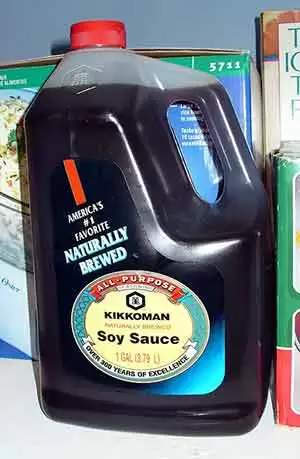
Celiac.com 10/11/2012 - Would you be surprised to learn that a number of naturally brewed soy sauces are technically gluten-free? I was.
I was recently doing some research for a catered even and needed to make a decision about what kind of soy sauce to use in the food preparation. Since the Korean food being served required a great deal of soy sauce for marinating purposes, the hosts were concerned that gluten-free tamari might end up costing too much. However, the event included a number of folks who eat gluten-free, and the hosts did want to provide food that everyone could eat. So, what to do? The restaurant making the food uses Kikkoman. Is Kikkoman safe to serve to people with celiac disease and gluten-intolerance?
Celiac.com Sponsor (A12):
In an effort to answer that question, I did a bit of research. I was a bit surprised when my research led me to an interesting article on the naturally fermented soy sauce made by Kikkoman and Lima Foods, which are two major manufacturers of soy sauce.
There are two ways to manufacture soy sauce. The first uses natural fermentation. The second uses chemical hydrolysis. Both methods will break down the complex proteins including gluten into smaller components such as amino acids and polypeptides.
However, the soy sauces tested for the article were produced using natural fermentation. That's because chemically produced (or artificial) soy sauce is may contain toxic and carcinogenic components produced by hydrochloric acid hydrolysis.
The article said that the soy sauces made by these companies actually met Codex Alimentarius standards for gluten-free foods, and that tests show their gluten content to be well under the 20ppm required for gluten-free products.
The people who produced the article sent samples out to a major laboratory in the Netherlands for gluten analysis, and the results were surprising.
Gluten content in both samples was well under the acceptable detection limit of 5ppm (see report).
According to a new European laws, any product labeled gluten-free must contain less than 20 ppm gluten. The FDA has proposed the same 20 ppm level for their rule, which they look set to implement very soon.
That means that the naturally fermented soy sauces that were tested meet gluten-free standards, and will likely not trigger adverse reaction in gluten sensitive individuals, especially considering the small daily quantities of soy sauce consumed.
Anyone who does not trust this can, of course, choose soy sauces that do not contain any wheat to start with. Tamari soy sauces are typically produced without wheat, but some brands do not follow this tradition and are not wheat-free, so: Buyer beware.
As for the catered event, after talking with the gluten-free guests, the hosts decided to go with traditional Kikkoman. They have not received any reports of illness or adverse reactions, even in the several people with high gluten-sensitivity.
I'm sure there are plenty of gluten-free eaters who have plenty to say about soy sauce. What's your take on the test results?
Source:






Recommended Comments
Create an account or sign in to comment
You need to be a member in order to leave a comment
Create an account
Sign up for a new account in our community. It's easy!
Register a new accountSign in
Already have an account? Sign in here.
Sign In Now